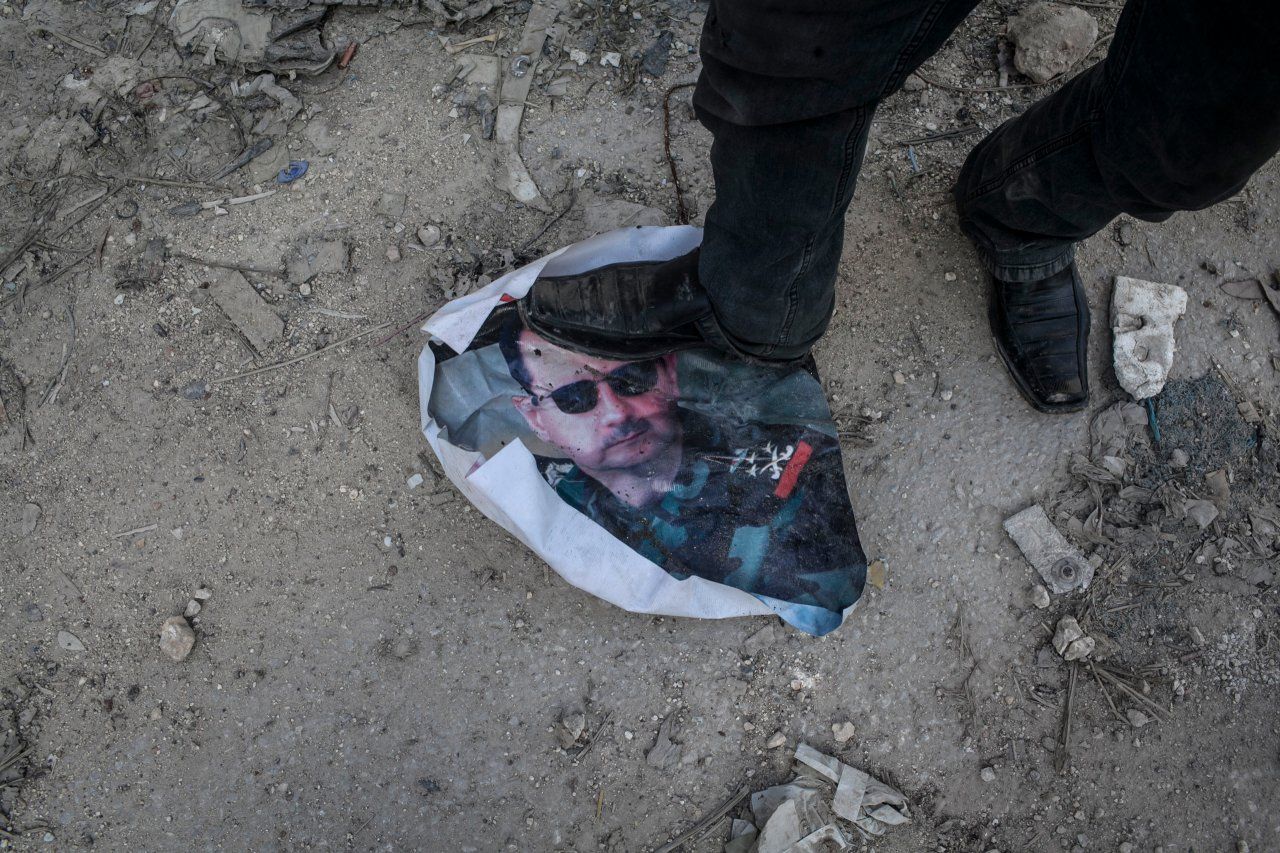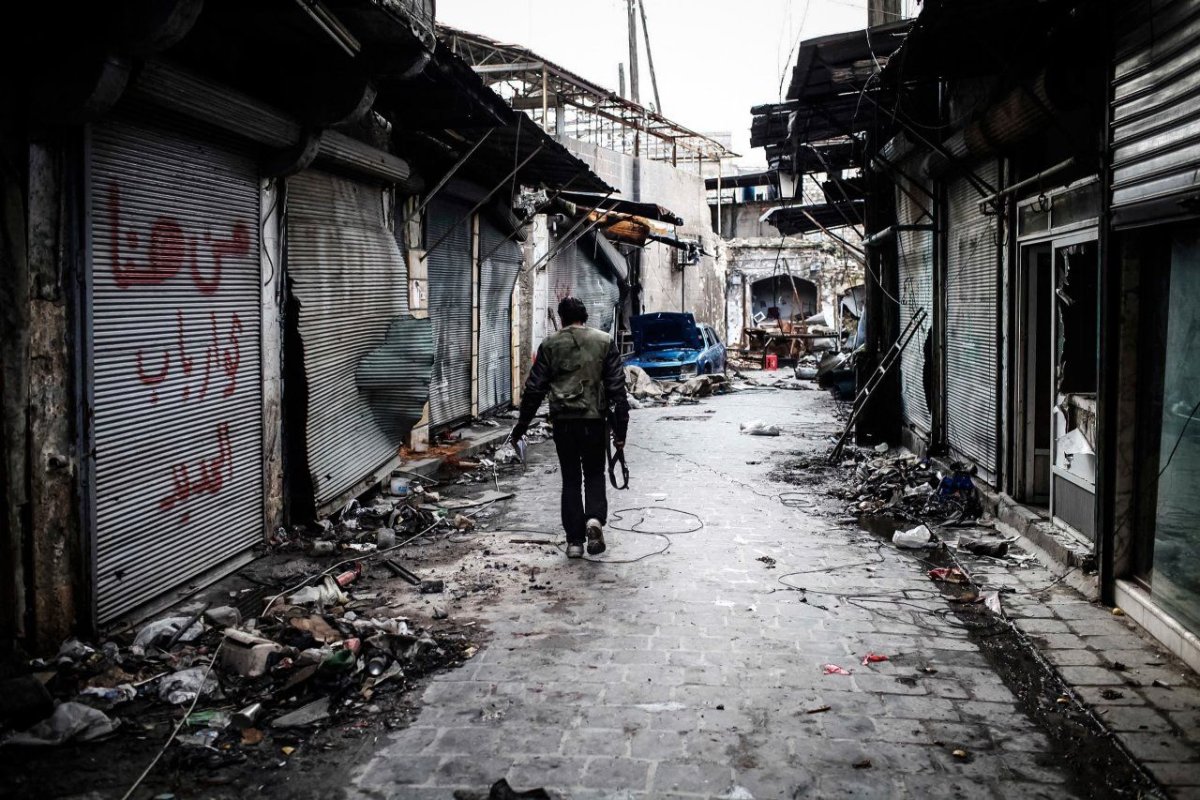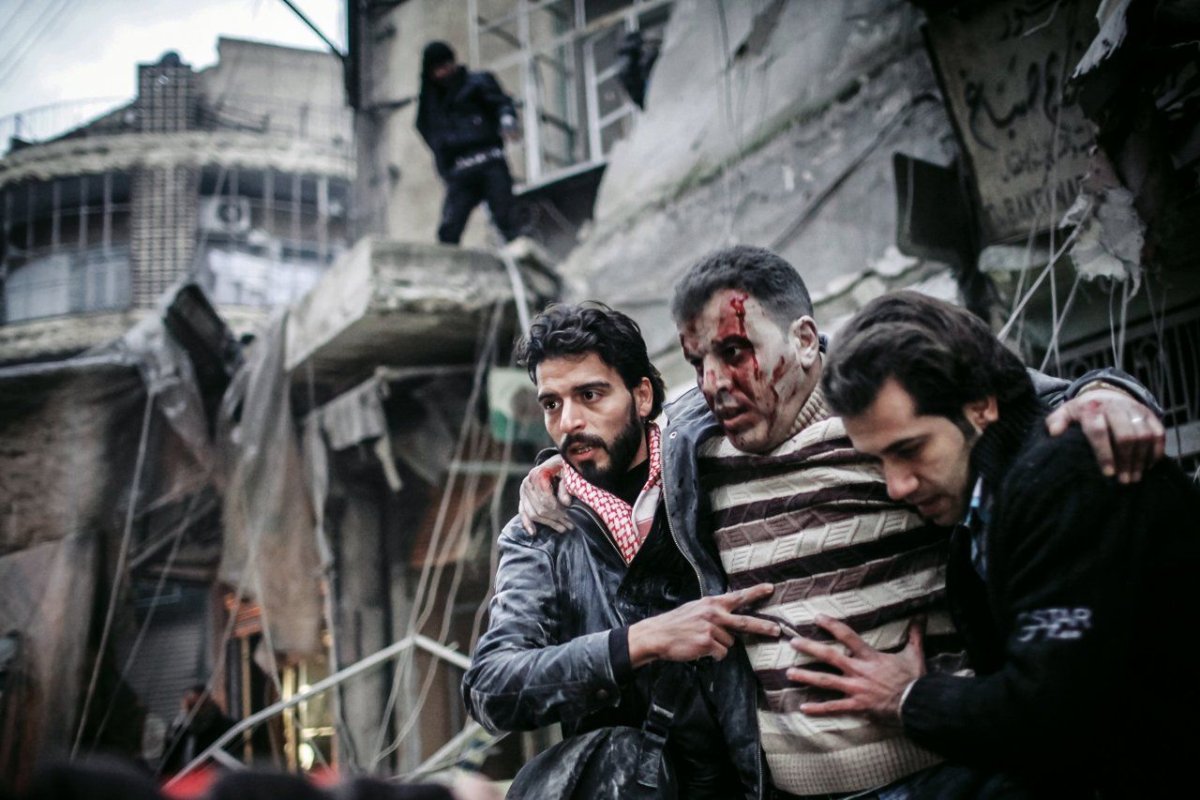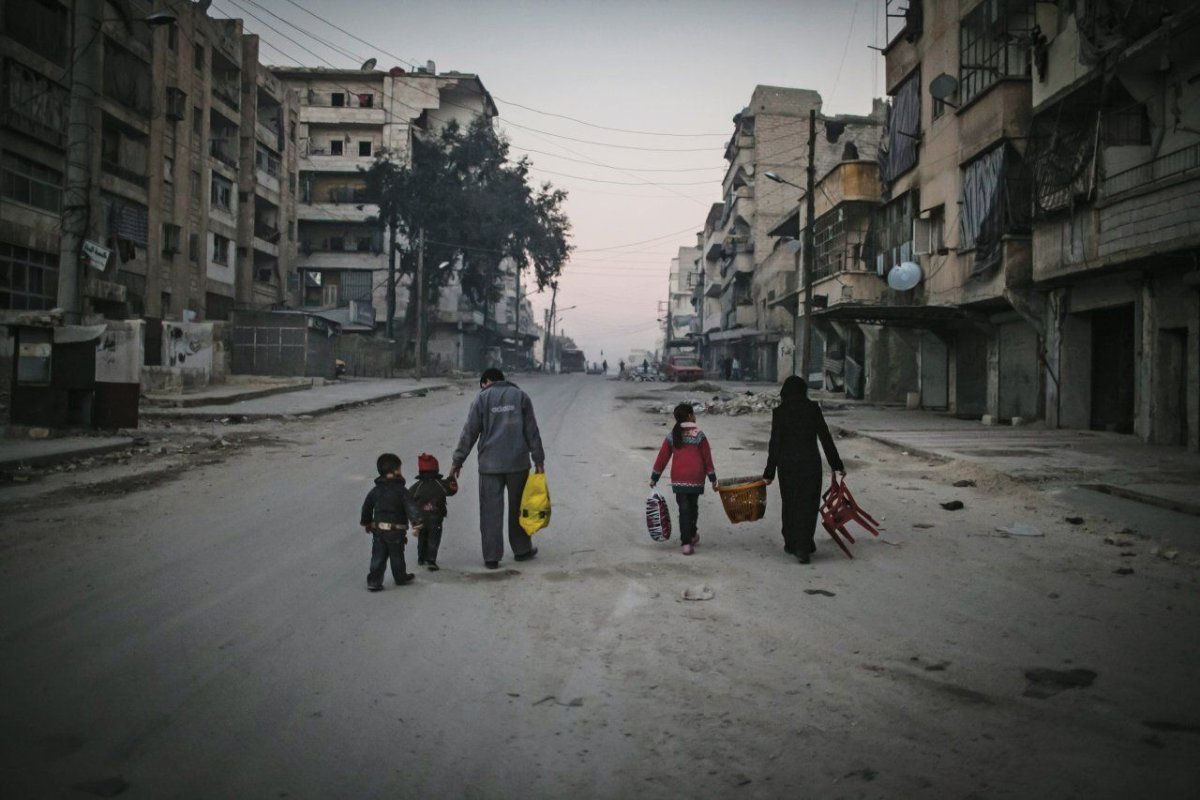
Why does war still savage Syria? When will it stop? Is President Bashar al-Assad a man trapped in his dead father's web? Has his cruelty been thrust upon him by family and fate, or is it entirely of his own making? Does he want to flee in defeat? To admit he has been ruinously wrong?
Throughout its modern history, Syria has witnessed violence in the course of political conflicts that started during the rule of Hafez al-Assad, the fearsome father of Bashar. Going through the biography of the father, we see how an irrepressibly ambitious officer in the Syrian Air Force climbed the ladder, step by step, sacrificing all his comrades, till he seized power and ruled Syria in a totalitarian way, and bequeathed to his son a solid and brutal regime.
During the years of the union between Syria and Egypt (1958–61), five Syrian officers from minority groups met and decided to form a military committee with the aim of seizing power. Hafez was one of them. While Syria was enjoying a parliamentary democracy that represented the majority of the population, these officers launched a military coup that overthrew the elected government and brought their Baath Party to power. In the following years, several coups took place as a consequence of the internal conflicts in the government, until Hafez became the defense minister. Then, taking advantage of a conflict between the government's left and the right wings, Hafez carried out a coup in 1970, which jettisoned everybody else from office and made him sole leader. Hafez established a pragmatic regime that seemingly supported Arab nationalism. What worried him most was the memory of Syria's defeat in the war with Israel in 1967. That is why he launched the 1973 war—declaring, against all evidence, that he had won—and then started to establish the terrible structure of his regime.
The power structure he put in place is still in force today. At its apex is President Bashar al-Assad, who belongs to the minority Alawite sect. He fully controls the military and the security apparatus, which, in turn, controls all aspects of the administration, including the Baath Party, the Council of Ministers, the judiciary, the Peoples' Assembly (Parliament), all trade unions, the media, and the economy. Each organ of the authority, whether civil, military, or security, has a governing body or a council headed, directly or indirectly, by the president, in accordance with the Constitution, written under his instructions. All positions of power are held by the president, who directs them in the way he wants or even sometimes lets them confront each other, if he wishes.

While the party, the trade unions, and the economy were a soft form of authority, under Hafez, the 14 different security agencies and the elite branches of the armed forces were considered the violent arms of his power. The authorities used punishment, ranging from deprivation of all means of livelihood to imprisonment, torture, and even death, and it rewarded the loyalists and supporters by enabling them to benefit from the widespread corruption that existed for this purpose.
A state of violence and terror was established by Hafez. Torture was carried out in the prisons and dungeons of the multiple security agencies, and they leaked news about their brutality in order to spread fear and terror among the people. This hidden violence and brutality were brought to the surface when needed, especially when some forces appeared to pose a threat to the regime. Between 1980 and 1982, many executions took place, including the massacre of Aleppo, in which 100 civilians were killed in the street; another massacre in the political prison of Palmyra, where up to 1,000 prisoners were slaughtered in retaliation for an assassination attempt on the president; and the massacre of Hama, where elite troops besieged the city for more than 20 days, shelling it with artillery and tanks, destroying a third of its ancient buildings, and killing more than 30,000 civilians. Robert Fisk, a Western journalist, described those remorseless operations in reports he dispatched from Syria, but no one in the West listened.
In his plan to achieve an authoritarian structure to control Syria, Hafez depended on the loyal Alawite minority sect. They dominated the Army, the security apparatus, and the media. To entwine their interests with his, he sought ways to make them rich through a parallel economy. He gave them a free hand to smuggle essential goods badly needed by the people, instructing the government not to make these commodities available on the market. His aim was to create an economy that was fully loyal to him and, through this, to compete with the well-established Sunni merchants and industrialists in the major cities of Aleppo and Damascus. He told his biographer Patrick Seale, the author of the book Assad: The Struggle for the Middle East, that his dream was to see the Alawite capitalist class grow rich and powerful. To this end, he ordered the government to place controls on nongovernment investments, as well as on the import and export of commodities for almost 20 years. By the early 1990s, when he had made sure that many of his Alawite followers had amassed enough illegal wealth, he issued Decree No. 10, which opened investment in the private sector. But he was astonished when he found that the traditional capitalist class, which he thought had been squashed and had vanished, was willing to compete in this lucrative domain.
The structure of power created by Hafez needed an heir to take over, ideally one of his children. If he died without a legitimate heir, the whole structure would collapse. Fortunately for Hafez, he had four sons and one daughter. He had started preparing his eldest son, Basil, to succeed him by pushing him into prominence. Basil became a celebrity. He was a sportsman and good rider who participated in horse races that he would always win. With his well-groomed beard, he became an object for women. It was rumored widely that Basil would come to power and eradicate the pervasive corruption. But Basil was killed in a car accident in 1994: according to the official version, he was driving recklessly on his way to Damascus International Airport. The death of his chosen heir was a disaster for Hafez, who suffered from several diseases and knew he would die soon. So he turned to his second son, Bashar, who was in Britain at the time, preparing for his postgraduate studies in ophthalmology.

Bashar was not nearly as well known in Syria as his brother. He had distanced himself from the intricate problems of power and liked to live his own life. Bashar had recently graduated as an ophthalmologist from the Faculty of Medicine at Damascus University and planned to follow this career without involving himself in government issues. In many cases people would stop him in the corridors of the hospital to complain to him about something or protest about the unjust behavior of the gangsterlike shabiha, thugs and enforcers who belong to the Assad family. He would listen politely and silently, then shrug and say that he did not involve himself in such matters. It was rumored that he was ashamed of the bad behavior of his cousins or that he was a timid guy. While his brother Basil took part in horse races, coming first in rigged competitions; drove fast boats in the Mediterranean in Latakia; and even occasionally punished his thuggish cousins, Bashar preferred to keep away from the spotlight, clinging to a small group of friends from the field of information technology. He was never known to have supported any of his friends to gain higher positions or helped anyone to strike a deal in business or construction.
The ophthalmologist Bashar was living in London quietly and happily, blithely attending lectures and enjoying the good life. He liked to have coffee or dinner in a quiet restaurant without being noticed as the son of the Syrian president. In this largely anonymous life, in which he exercised and followed special diets to maintain his slim shape, Bashar received the bad news of the death of his brother and an urgent phone call from the presidential palace in Damascus telling him to return immediately to Syria, for good.
After the mourning ceremonials for his brother, and after speeches were delivered at al-Qardaha village, the birthplace of his father, at the top of the Alawites' mountain fastness, Bashar had to start immediately to learn how to rule and to begin to become more popular with the public.
The regime in Syria is republican, not royal, but thanks to the system created by Hafez, it became necessarily hereditary. If the regime were royal, there would be a first and a second heir and so on. And the heir would know what was awaiting him, and from an early age he would be taught that he would be the king. But it was a surprise, even to the young Bashar, that he had become the heir. He was further surprised to hear that the Syrian Constitution, and what he was told by his father in particular, was nonsense—that the claim that every Syrian citizen has the right to become president of the republic was false. He learned that everything was arranged in an authoritarian way, the Constitution be damned. It would be enough to bring along several hundred supporters to demonstrate and cheer before television cameras and demand to have Bashar as the president even though his age, then 34, did not legally comply with the Constitution (which stipulates that the president must be 40). But what did it matter, because he learned that the hand of the regime is ready to smite all those who show opposition.
Soon after the death of his father in 2000, the young man who liked to spend his time in cafés in earnest communion with his laptop, the incongruously nerdy scion of an iron-fisted tyrant, found himself president of the country. He took the place of his deceased father, grasping all the reins of government and heading the security apparatus. He became the president and commander in chief of the Army and was immediately promoted to the rank of staff major general, head of all security agencies, and chair and theorist of the ruling Baath Party. He also became the head of the Supreme Judicial Council. According to the powers set forth in the Constitution, the president has the power to dissolve the People's Assembly and appoint the prime minister and the ministers, as well as the ability to sack them whenever he wants. In short, and overnight, he became the absolute leader of everyone and of everything in Syria.
He was an affable person and mild mannered, and the people liked him. He wanted to bring progress to Syria. He attended forums on the economy and listened attentively to debates. Everyone noted that he liked to listen, that he had a sympathetic ear. He encouraged putting forward initiatives and urged many Syrian personalities abroad to return home from their exile. He gave some of them important ministries and opened the door for public dialogue in the pages of the state-owned newspapers.

But soon Bashar the Reformer bumped hard into the walls of the adamantine structure built by his father. And equally soon, he backed down on the promises he had given, jilting all those who were growing fond of him. He awakened to the reality of a system that commands the ruler to run the country with an iron hand. In this system there is no room for dialogue or debate, only orders issued by the president. It was a system of terror and submission that would falter and fall if there was any slackness or relaxation by its head. And if it did that, the Alawite minority would lose its power, its privileges, its primacy, its decades-old strut. He was trapped in a cul-de-sac of his father's making.
Bashar married a young woman, Asma al-Akhras, who was born and educated in Britain and whose parents are from the Sunni majority in the city of Homs in central Syria. Asma quickly attracted attention for being an attractive and elegant woman. The dashing couple frequently appeared in public. President Chirac received them at the Élysée; Vogue magazine called Asma "a rose in the desert." She gained the admiration of Syrian women, and her popularity was widespread, reaching levels unprecedented for an Arab "first lady." The couple would appear all of sudden at a restaurant in the Bab Touma quarter in old Damascus, or at the Aleppo Club in Aleppo, and people would hurry to have souvenir photos taken with them. Syrians acquired a new and sudden taste for political glamour.
Bashar was intoxicated by the way his subjects rushed and gathered around him whenever he suddenly appeared in restaurants, clubs, or old souks. I once saw a photo of him surrounded by so many stalwart merchants of Aleppo, he could hardly move. He liked to drive his car himself, even when escorted by his bodyguard. He invited his official guests and visiting foreign journalists for disarming dinners in the city's restaurants. In Aleppo, he was seen many times in the company of the Turkish prime minister, Recep Tayyip Erdogan, dining at this restaurant or that. Of course, all this happened when the relationship with Turkey was at its best, before the rebellion turned Erdogan into his most implacable foreign critic.
The slide from grace started in Daraa, in south Syria. In March 2011 a few schoolboys wrote slogans echoing the Egyptian revolution on the walls of their school. The local security agencies treated the boys harshly, reportedly torturing and injuring them. When the people in the city learned what had happened, they poured out into the streets angrily, but security agents, true to Syrian ways, fired at them, and civilians were killed. The security apparatus simply dealt with the opposition in its time-honored manner: brutally and directly, according to the unwritten principles by which they were established.
Here was the defining moment for the president, the educated man and doctor who everyone attested had a nice and friendly character. What was he supposed to do at that moment, other than go and meet the angry people and calm their anger, and apologize to them for the physical abuse inflicted on their children? But President Bashar knew very well that he could not govern if he abased himself in that way. His belief in the system built by his father made it impossible for him to act in ways Hafez would have despised. So he kept sending his forces to crush the angry protesters, who were now in demonstrations not only because their brothers and relatives were imprisoned, tortured, and injured, but also because other Syrians—their fellow citizens—were being shot dead. They demonstrated against the violence directed against them and for the sake of those who were killed the day before. And since others would be killed today, the people would demonstrate the next day in protest for their killing. A series of killings, then a series of protests, followed by another series of killings and protests, and so it went. All this was filmed and uploaded to YouTube, and the protests became known throughout Syria, and then the world. When the demonstrations expanded and demanded the fall of the regime, the president kept up his press of military troops to crush the demonstrators, to shoot at them, to kill them. Inevitably defections from the military and security forces started to take place, and the crisis became a civil war.
The harsh military-security apparatus set up by his father, so successfully tested in the troubles of the 1980s, was the only option for Bashar. The young president was completely immersed in his father's experience. His father's legacy dominated the mentality of the son, and he could not escape from it, or think outside it. Every time Bashar the president confronted a new development in the current crisis, he resorted not to his own common sense but looked back for similarities to what his father had experienced in the past and how he had reacted. He became a brutal mimic man.
Torturing the schoolboys was the only response the security apparatus knew. They had acted in this way many times, when the father (and the son) sent the Army to besiege cities and towns to have them completely destroyed by artillery, tanks, and aerial bombing. Hafez had always been successful with these methods of suppression, so why should he, Bashar, not also be successful? The son thought in this way, and it is the only way he could allow himself to think. He is, after all, the good son who follows his father's posthumous instructions. But it's his calamitous luck that technology has evolved dramatically, that it is now possible to send photos and video clips of shootings for the world to see. There was no YouTube in Hama in 1982.
Like his father, Bashar analyzes and identifies his opponents as hardline Islamists in filial imitation. In the late 1970s and 1980s, Hafez faced armed groups of the Muslim Brotherhood, and he rallied secular political forces, because he was confronting what was considered a fundamentalist movement. Today the protest movement in Syria, from its start, was not an Islamic movement. It refused to be called this and ridiculed the state media that had maligned it as such.
Islamist slogans and flags were not raised in the first demonstrations that demanded the fall of the regime. Only the Syrian flag of independence was flown, and flowers were held, and songs were chanted against both the son and the father—which included, let it be said, words not liked by the Islamists. We think of the masses who gathered in the square in Hama when the American ambassador to Syria, Robert Ford, visited on July 8, 2011. But Bashar's troops killed, arrested, or deported the leaders of the protesters, a fact that turned this revolution into an armed rebellion with a significant Islamic nature. By his methods, he has made his fantasy come partly true.
Bashar continued to have dinner at nights with some of his relatives and friends at one of his favorite restaurants in Damascus, in spite of the fact that battles were being fought throughout his country—sometimes within earshot of their clinking glasses. You would see him sitting in a far, quiet corner. While all those accompanying him were chatting and laughing, Bashar would sit silently, absorbed in his iPad. With the arrival of fighting in Damascus, he has stopped dining out.
His sister left for Dubai with her children after her husband was killed, and then Bashar's mother followed his sister. People say Bashar has sent his wife to live somewhere safe with their kids, away from him. I can imagine him now, busy with the fighting for most of the day, for maybe as many as 18 hours. But at night, he sits in his bed with his iPad, surfing the websites he likes, while listening to the gunfire that comes closer and closer. London must seem like a lifetime away for this eye doctor, forever his father's son.
Uncommon Knowledge
Newsweek is committed to challenging conventional wisdom and finding connections in the search for common ground.
Newsweek is committed to challenging conventional wisdom and finding connections in the search for common ground.
About the writer
To read how Newsweek uses AI as a newsroom tool, Click here.








